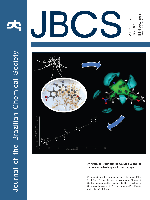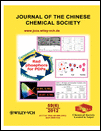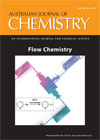
Vietnam Journal of Chemistry
Scope & Guideline
Exploring the Frontiers of Chemical Science
Introduction
Aims and Scopes
- Materials Chemistry:
Research on the synthesis, characterization, and application of various materials, including nanomaterials, composites, and polymers, often focusing on their properties and potential uses in technology and industry. - Environmental Chemistry:
Studies that explore the chemical processes and reactions affecting the environment, including pollution control, waste treatment, and the development of eco-friendly materials and methods. - Biochemistry and Chemical Biology:
Research on the chemical processes within and related to living organisms, including the study of natural products, enzyme activities, and potential pharmaceutical applications. - Analytical Chemistry:
Development and application of innovative analytical techniques for the detection and quantification of chemical substances in various matrices, including environmental samples and biological materials. - Green Chemistry:
Research focused on sustainable practices in chemistry, including the development of eco-friendly synthesis methods, biodegradable materials, and renewable resources. - Computational Chemistry:
Theoretical studies and computational modeling aimed at understanding chemical phenomena, predicting molecular behavior, and assisting in the design of new compounds.
Trending and Emerging
- Sustainable Materials and Green Chemistry:
There is a growing emphasis on developing sustainable materials and methods, highlighting the use of renewable resources, biodegradable materials, and eco-friendly synthesis techniques. - Nanotechnology and Nanomaterials:
Research on nanotechnology is increasingly prominent, particularly in applications for environmental remediation, drug delivery, and advanced materials, reflecting the expanding role of nanoscale materials in various fields. - Biochemical Applications and Natural Products:
There is an emerging trend towards the exploration of natural products for their biochemical properties, including their potential as therapeutic agents and their role in health and nutrition. - Electrochemical and Sensor Technologies:
The development of novel electrochemical sensors and technologies for environmental monitoring and health diagnostics is gaining traction, showcasing the intersection of analytical chemistry with practical applications. - Computational and Theoretical Chemistry:
A significant increase in the use of computational techniques for drug design, molecular modeling, and materials science indicates a shift towards integrating computational methods with experimental research.
Declining or Waning
- Traditional Organic Synthesis:
There has been a noticeable reduction in papers focusing solely on traditional organic synthesis methods, possibly indicating a shift towards more innovative, green, or computational approaches. - Basic Inorganic Chemistry:
Research in fundamental inorganic chemistry seems to be less frequent as the journal emphasizes applications and interdisciplinary studies, moving away from purely theoretical discussions. - Conventional Material Testing:
Studies that focus solely on the mechanical or physical properties of materials without addressing their practical applications or sustainability aspects have become less common. - Pharmaceutical Chemistry:
While still relevant, the number of papers specifically addressing pharmaceutical chemistry, particularly those not involving innovative drug design or natural product chemistry, appears to be declining. - Classic Chemical Education:
Papers focused strictly on chemical education methods or curriculum development have decreased, suggesting a shift towards more research-driven content.
Similar Journals

Jordan Journal of Chemistry
Connecting Minds: Elevating Chemistry Research to New Heights.The Jordan Journal of Chemistry is a prominent publication dedicated to advancing the field of chemistry in Jordan and beyond. Published by the Yarmouk University Deanship of Research & Graduate Studies, this journal serves as a platform for researchers, educators, and practitioners to disseminate their findings in a variety of chemistry sub-disciplines. Although currently classified in Q4 of miscellaneous chemistry and ranking within the 9th percentile according to Scopus, the journal plays a crucial role in fostering academic dialogue and collaboration in the region. With its ISSN 1814-9111 and E-ISSN 2079-7249, the Jordan Journal of Chemistry offers open access to researchers from diverse backgrounds, ensuring that critical research is both accessible and impactful. By bridging local studies with global scientific advancements, this journal is poised to contribute significantly to the growth and recognition of chemistry as a key scientific discipline in the region, with convergence efforts set from 2020 to 2024.

JOURNAL OF THE BRAZILIAN CHEMICAL SOCIETY
Catalyzing Knowledge: Transforming Chemistry Through Open DialogueThe Journal of the Brazilian Chemical Society (ISSN: 0103-5053; E-ISSN: 1678-4790), published by the Sociedade Brasileira de Química, stands as a prominent outlet for disseminating high-quality research in the field of chemistry. Since its establishment as an Open Access journal in 1990, it has been committed to providing unrestricted access to innovative findings and discussions that propel the advancement of chemical sciences globally. Located in the vibrant research landscape of Brazil, this journal aims to showcase a wide range of topics including analytical, organic, inorganic, and physical chemistry, among others, catering to a diverse audience of researchers, professionals, and students alike. The journal holds a noteworthy distinction with a Q3 quartile ranking in the field of miscellaneous chemistry for 2023 and is indexed in Scopus, reflecting its growing influence in the academic community. With a publication cycle that spans continuously from 1990 through 2024, it serves as a vital resource for anyone seeking to stay informed about the latest trends and breakthroughs in chemistry.

JOURNAL OF THE CHINESE CHEMICAL SOCIETY
Bridging Theory and Practice in Chemical SciencesJOURNAL OF THE CHINESE CHEMICAL SOCIETY, published by WILEY-V C H VERLAG GMBH, is a vital resource in the field of chemistry, focusing on a broad array of topics pertinent to general chemistry and its advancing sub-disciplines. Established in 1954 and running through 2024, this journal serves as a significant platform for the dissemination of high-quality research, showcasing innovative findings and developments within the chemical sciences. With its Q3 category ranking and positioning at Rank #203 in General Chemistry per Scopus, it reflects the journal's commitment to research excellence and impact. While not an open-access publication, it ensures accessibility to a global audience, making it an essential tool for researchers, professionals, and students alike seeking to stay informed and engaged in the evolving landscape of chemistry.

INDIAN JOURNAL OF CHEMICAL TECHNOLOGY
Empowering Scholars with Cutting-edge ResearchThe Indian Journal of Chemical Technology, published by the Natl Inst Science Communication-NISCAIR, is a pivotal platform for the dissemination of innovative research in the field of chemical technology. With an ISSN of 0971-457X and an E-ISSN of 0975-0991, this journal has been serving the academic community since its inception in 1994, and is set to continue through 2024. The journal holds a Q4 ranking in both the Chemical Engineering and Chemistry categories as of 2023, though it showcases a significant breadth of research, making it a valuable resource for both emerging and established scholars. Although it currently operates without an open-access model, the journal aims to facilitate knowledge exchange through rigorous peer-reviewed publications, allowing researchers and professionals to stay updated with the latest advancements and practices in chemical technology. Located in New Delhi, India, the journal not only contributes to national scientific dialogue but also plays a key role in the global conversation around chemical sciences by addressing unique challenges and innovations pertinent to the region.

JOURNAL OF THE CHEMICAL SOCIETY OF PAKISTAN
Connecting Local Insights with Global Impact.JOURNAL OF THE CHEMICAL SOCIETY OF PAKISTAN is a premier academic journal published by the Chemical Society of Pakistan, focusing on advancing the field of chemistry through rigorous research and scholarship. Established in 1996, this journal aims to disseminate high-quality research articles, reviews, and insights pertaining to various subfields of chemistry, making substantial contributions to both local and international scientific communities. With a current impact factor placing it in the Q4 category, the journal continues to foster discussions on emerging trends and innovations within the discipline. Additionally, it holds a Scopus rank of #305 out of 408, highlighting its growing influence despite being positioned in the 25th percentile. Although it is not an open-access journal, it provides a crucial platform for researchers and professionals in Pakistan and worldwide. The JOURNAL OF THE CHEMICAL SOCIETY OF PAKISTAN serves as a valuable resource for students, educators, and industry professionals alike, facilitating the exchange of knowledge and promoting advancements in chemical sciences.

Journal of Chemistry and Technologies
Unlocking Potential in Chemistry and Chemical Engineering.The Journal of Chemistry and Technologies, published by OLES HONCHAR DNIPROPETROVSK NATIONAL UNIVERSITY, is an open access journal dedicated to advancing knowledge in the broad fields of chemistry and chemical engineering since its inception in 2013. With ISSN 2663-2934 and E-ISSN 2663-2942, this journal provides a vital platform for researchers and professionals, particularly in Ukraine and beyond, to share innovative research findings and contemporary technological advancements. Currently ranked in the Q4 quartile in both Chemical Engineering and General Chemistry for 2023, it serves as an enriching resource for those interested in emerging trends and interdisciplinary studies within these domains. The journal adheres to high academic standards while fostering collaboration in the scientific community by offering open access articles that ensure visibility and accessibility to a global audience. As an important part of the academic landscape, the Journal of Chemistry and Technologies aims to inspire future research and development, paving the way for new discoveries and applications in chemistry-related fields.

JOURNAL OF CHEMICAL RESEARCH
Elevating Chemistry: A Platform for Groundbreaking Studies.JOURNAL OF CHEMICAL RESEARCH, published by SAGE PUBLICATIONS LTD, serves as a pivotal platform for scholars and practitioners in the field of Chemistry. With its ISSN 1747-5198 and E-ISSN 2047-6507, this journal has established itself as a reliable source of innovative research since its inception in 2000. The journal's comprehensive scope encompasses various facets of chemical research, providing a broad spectrum of articles that foster scientific advancement and technological innovation. Ranked in the Q3 tier of miscellaneous chemistry journals in 2023, with a Scopus rank of #246 out of 408, it represents a solid outlet for emerging and established researchers alike. Although currently not an open-access journal, its rigorous peer-review process ensures that only high-quality studies are published, catering to the academic and professional community's demand for credible and impactful findings. Positioned in the vibrant research landscape of the United Kingdom, the JOURNAL OF CHEMICAL RESEARCH is dedicated to expanding the frontiers of chemical sciences and is an essential resource for anyone committed to advancing this dynamic field.

Moroccan Journal of Chemistry
Uniting Global Scholars for a Deeper Understanding of Chemistry.Moroccan Journal of Chemistry, published by the University Mohammed Premier Oujda, serves as a pivotal platform for researchers and professionals in the field of chemistry, particularly focusing on diverse and emerging areas within the discipline. Established in 2018, this open-access journal facilitates widespread dissemination of scholarly articles, ensuring that cutting-edge research reaches a global audience. With an ISSN of 2351-812X and categorized in the Q3 quartile for miscellaneous chemistry in 2023, the journal maintains rigorous peer-review standards while fostering an inclusive environment for scientific dialogue. Located in Morocco, it aims to bridge local and international research communities, contributing to the advancement of knowledge in chemistry. As it continues to grow, the Moroccan Journal of Chemistry remains an essential resource for students, educators, and professionals eager to stay abreast of the latest developments in the field.

Ovidius University Annals of Chemistry
Unlocking Knowledge in Chemistry and Engineering.Ovidius University Annals of Chemistry is a prominent open-access journal dedicated to the field of chemistry and chemical engineering, published by OVIDIUS UNIV PRESS since 2012. With its ISSN 1583-2430 and E-ISSN 2286-038X, this journal seeks to foster innovative research and disseminate knowledge across diverse chemical disciplines. Situated in the vibrant academic setting of Ovidius University in Constanta, Romania, this journal receives contributions from a global pool of researchers, enhancing its relevance in the international scientific community. The open-access format ensures that all published articles are freely available, promoting a wider reach and impact of the research dissemination. As a valued resource for academics, industry professionals, and students alike, the Ovidius University Annals of Chemistry plays a crucial role in advancing the understanding of chemical sciences and engineering practices.

AUSTRALIAN JOURNAL OF CHEMISTRY
Advancing chemical knowledge, one article at a time.The Australian Journal of Chemistry, with an ISSN of 0004-9425 and an E-ISSN of 1445-0038, is a distinguished publication from CSIRO PUBLISHING, dedicated to advancing the field of chemistry since its inception in 1948. Based in Australia, this journal serves as a platform for original research articles, reviews, and innovative studies that encompass a wide spectrum of chemical disciplines, aiming to foster communication and collaboration among researchers globally. Despite its Q3 ranking in the Chemistry (Miscellaneous) category and standing at rank #236 in Scopus’ general chemistry classification, it remains an essential resource for professionals and students seeking to stay informed about emerging trends and discoveries in chemistry. The journal does not offer open access, emphasizing the premium quality of peer-reviewed content that adheres to rigorous academic standards. By bridging theory and practice, the Australian Journal of Chemistry continues to play a crucial role in shaping the future of chemical sciences.